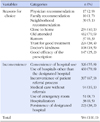Abstract
Purpose
Medical Aid Beneficiaries were surveyed to identify differences in health behaviors, adherence to drug regimen, and quality of life between those people in the Designated Doctor System and those who are not.
Methods
A total of 1,327 study subjects were separated into three groups: those in the Designated Doctor System for 2 years, those in for 1 year, and those not in the system.
Results
After the introduction of the Designated Doctor System, 55.8% and 67.9%, respectively, of the subjects in the Designated Doctor System complained of inconvenience in relation to hospital use and the patient referral process. Also, the rate of emergency room use or hospitalization guided by the Designated Doctor System was only 8.7% and 6.5%, respectively. There were no significant differences in health behaviors and adherence to drug regimens between those in the Designated Doctor System and those who are not.
Figures and Tables
References
1. Case Management Society of America.
KJ Jun
AY So
HG Kim
CW Kim
YM Kim
. Case management adherence guidelines 2.0. 2007. Seoul: Hyunmoonsa;(original work published 2007).
2. Helms LJ, Newhouse JP, Phelps CE. Copayments and demand for medical care: The California Medicaid experience. Bell J Econ. 1978. 9(1):192–209.
3. Huh BY, Kim CH, Park TJ, Lee KY, Cho B, Kim HJ. Development and evaluation of home doctor registration program. J Korean Acad Fam Med. 1998. 19(10):801–810.
4. Kang EJ, Choi EJ. 2005 The third Korea national health and nutrition examinations survey: Health behaviors of adults. 2006. Seoul: Korean Institute for Health and Social Affairs.
5. Kephart G, Skedgel C, Sketris I, Grootendorst P, Hoar J. Effect of copayments on drug use in the presence of annual payment limits. Am J Manag Care. 2007. 13(6):328–334.

6. Kim ES, Kim MY, Ko IS, Lee DM, Kim KS, Choi JS, et al. The current situation of medical Aid utilization and improvement direction in long-term utilizers. 2007. Seoul: Ministry for Health, Welfare and Family Affairs.

7. Kim JY, Ko SK, Yang BM. The effects of patient cost sharing on ambulatory utilization in South Korea. Health Policy. 2005. 72(3):293–300.
8. Lee DM. The need and model program for private doctor. J Korean Acad Fam Med. 1996. 17(3):194–197.
9. Lee YJ. A study of the factors and the regional difference of medical aid program recipient's medical utilization. Soc Welf Policy. 2007. 28:233–251.

10. Lim SJ. The effects of case management for medicaid on healthcare utilization by the medicaid system. J Korean Acad Community Health Nurs. 2010. 21(4):375–385.

11. Ministry for Health, Welfare, & Family Affairs. 2008 Guideline of medicaid management. 2008. Seoul: Author.
12. Ministry of Health & Welfare. 2007 Guideline of medicaid management. 2007. Seoul: Author.
13. Ministry of Health & Welfare. 2011 Guideline of medicaid management. 2011. Seoul: Author.
14. Morsky DE, Levine DM, Greene LW, Shapiro S, Russell RP, Smith CR. Five-year blood pressure control and mortality following health education for hypertensive patients. Am J Public Health. 1983. 73:153–162.
15. Shin HU, Shin YS, Hwang DK, Yoo YS, Choi GC, Lim SJ. Monitoring the designated doctor system. 2008-b. Seoul: Korea Institute for Health and Social.
16. Shin SM, Kim ES, Lee HW. The contributing factors to surplus medicine by long-term users of medical aid in Korea. J Prev Med Public Health. 2009. 42(6):403–407.
17. Shin YA, Shin HC, Shin HW, Park EJ, Hong SW, Shin SM, et al. Health services use and health status of medicaid beneficiaries according to medicaid policy change. 2008-a. Seoul: Ministry of Health, Welfare and Family Affairs, Korea Human Resource Development Institute for Health and Welfare, & Institute of Case Management for Medicaid.
18. Shin YE, Shin HC, Shin HW, Park EJ, Hong SW, Shin SM, et al. Study on the health status and hospital service utilization of Korea medicaid clients. 2007. Seoul: Korea Human Resource Development Institute for Health and Welfare.
19. Shin YJ, Yu YS, Choi YE, Shin SJ, Kim SJ, Uoo KS. Monitoring for medicaid financial efficiency and Improvement Direction. 2006. Seoul: Ministry of Health & Welfare.

20. Shin YS, Choi BH, Shin HU, Hwang DK, Eun SJ. The research regarding the healthcare expenditure and medical treatment material service use actual condition and a improvement program. 2005. Seoul: Ministry of Health & Welfare. Korean Institute for Health and Social Affairs.





 PDF
PDF ePub
ePub Citation
Citation Print
Print







 XML Download
XML Download